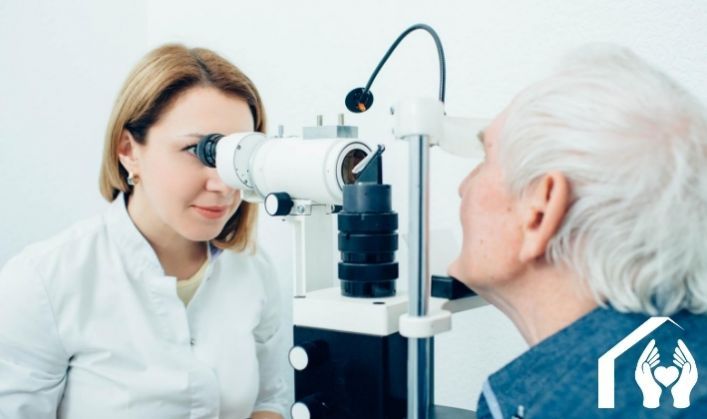-
August 19, 2020
As a person starts to age, the body begins to change. During this time, the eyes go through a shift that could lead to vision loss and developing an eye disease.
August is National Eye Exam Month. This month is dedicated to bringing awareness to the importance of getting your eyes checked.
To celebrate National Eye Exam Month, our home health care Omaha team wants to share some knowledge about why seniors need to take care of their vision.
Why do seniors need eye exams?
Seniors, in particular, should be getting eye exams regularly. Eye exams can help detect and prevent eye problems that are more common with older adults. Seniors have a higher risk of developing cataracts, diabetic eye disease or glaucoma.
The reason why seniors are at high risk for developing eye problems is due to age, existing illnesses and disease that can develop. Some diseases, like diabetes, can cause vision to be lost over time.
How often should seniors get eye exams
Experts suggest that seniors should be getting annual eye exams. However, older adults who are at higher risk of losing vision should get eye exams more frequently. This can help prevent vision loss from occurring.
Older adults at higher risk of losing eye vision include people with diabetes and high blood pressure. There are some prescriptions that seniors could be taking that can cause vision loss. If your family has a history of eye diseases, you could have a higher chance of losing your vision.
Signs that seniors are experiencing eye problems
Some eye vision illnesses are preventable. Look out for these common signs that could indicate eye problems:
-
Blurred or foggy vision
-
Seeing double
-
Sensitivity to light
-
Change in color in the iris
-
Seeing halos around lights at night
-
New onset or sudden change in floaters.
Common eye problems for seniors
Cataracts
A cataract is clouding in your eye’s lens. This cloudiness makes it difficult for the person to see. A person with cataracts might see everything through a cloudy window.
The most common cause of cataracts is age. It is typical for people over the age of 60 to start developing some clouding in their lens. However, over time it could develop into eye problems.
Glaucoma
Glaucoma is the leading cause of blindness for people over the age of 60. This eye disease damages the eye’s optic nerve. Extra fluid in your eyes builds up and causes pressure in the eye that can damage the optic nerve and lead to blindness. The good news is that blindness from glaucoma is preventable when treated early.
Diabetic retinopathy
Diabetic retinopathy is an eye disease that affects people with diabetes. This eye disease damages the retina's blood vessel when blood sugar levels are too high. Both people with type one and type two diabetes can develop this eye problem. If a senior loved one has diabetes, you should ask them how often should seniors get eye exams?
Age-related macular degeneration
Age-related macular degeneration is an eye disease that affects your central eye vision. This eye disease affects older adults more often. It is the leading cause of blindness in people 50 years old or older.
How home health care Omaha can help seniors with vision loss
One of the best ways to help seniors with vision loss is choosing in-home care. A caregiver can drive seniors with vision problems to appointments or to get groceries. These professionals can also assist them with cooking, cleaning and personal care needs.
Let the caregivers at Akkase Home Health Care help! Our home health care Omaha team provides various services to assist any seniors living independently at home. Contact us to set up a consultation.
-

Comments